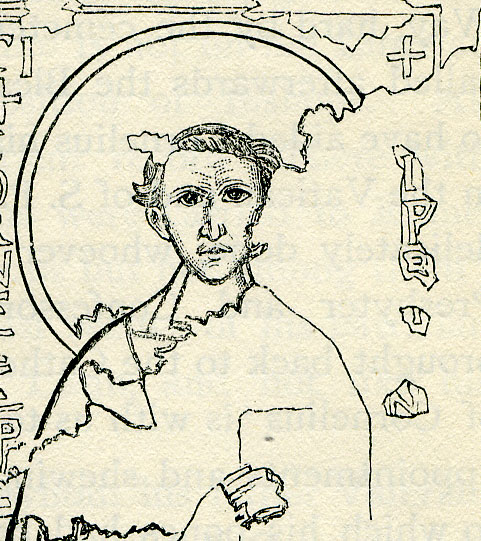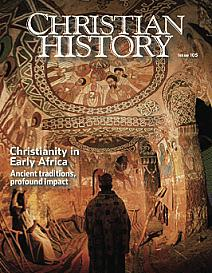African Bishops Argued with the Pope About Baptism

[above: Cyprian from an early manuscript. Benson, Edward. Cyprian; his life, his time, his work. London: Macmillan, 1897. public domain]
THE ROMAN EMPIRE persecuted Christians severely during the reigns of Emperor Decian (249–251) and Valerian (253–260). To escape persecution, Christians had to provide a certificate—a libelli—proving they had sacrificed to the Roman gods. Some did indeed sacrifice. Others who did not purchased libelli saying they had. Those who stood for the faith were called “confessors.” Considerable numbers of them became martyrs.
During the Decian persecution, Cyprian, the newly-elected bishop of Carthage, went into hiding. From his safe retreat, he attempted to succor and direct his flock with letters. After the persecution died down, large numbers of lapsed Christians requested readmission to the church. Some confessors and church leaders were opposed to readmitting the lapsed Christians at all, saying there was no forgiveness for those who had renounced Christ, especially if they had actually sacrificed to demons. Other confessors and leaders were willing to readmit the lapsed on easy terms. Cyprian took a stand that allowed readmission but prescribed penalties and delays in proportion to the severity of danger or suffering the lapsed Christian had faced.
Most North African Christians accepted Cyprian’s position. Among those who did not, groups formed their own Christian sects. They began to baptize adherents and offer them Communion. Cyprian insisted that there was only one true universal church and denied that rival groups could possess the Holy Spirit. Therefore their baptisms were invalid. Anyone who left a rival sect and asked to join the Catholic church had to be rebaptized. He wrote:
The Lord declares and vindicates the principle in his gospel that only through those who possess the Holy Spirit can sins be absolved. [In John 20: 21–23 Jesus breathed the Holy Spirit on the apostles and gave them power to remit sins] Therefore, in this passage he gives us the proof that only someone who possesses the Holy Spirit can grant baptism and the forgiveness of sins that accompanies it.
North African bishops discussed the issue in three councils, agreeing with Cyprian. On this day, 1 September 256, eighty North African bishops voted unanimously that Christians who had been baptized by another Christian sect must be rebaptized upon reentering the true church. Since these sects did not have the Holy Spirit, they could not impart the Spirit’s unction at baptism and the baptisms were invalid.
Stephen, Bishop of Rome, disagreed. Christians, he said, are baptized in the name of Christ. No matter who does the baptizing, as long as the person is baptized into Christ, the rite is valid. It is Christ, not the bishop, who validates the sacrament. North Africa and Rome seemed on a collision course. Several bishops in the East sided with Cyprian. But then Stephen died and his successor did not press the issue. Eventually, the worldwide church adopted the Roman view.
—Dan Graves
READ MORE ABOUT CYPRIAN AND NORTH AFRICAN CHRISTIANITY IN CHRISTIAN HISTORY 105, CHRISTIANITY IN EARLY AFRICA
Other Events on this Day
- Cambridge Synod Wrestled with Church-State Relationships
- MASSACHUSETTS CHRISTIANS HELPED THE POOR GET GOOD BOOKS






